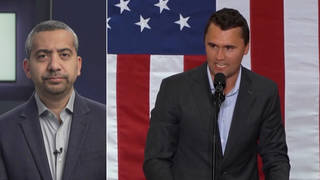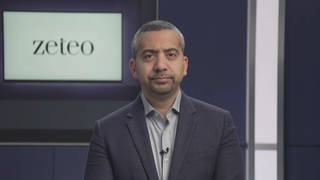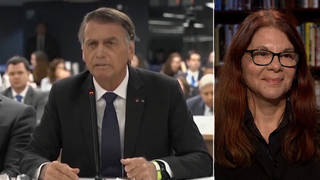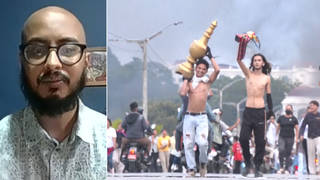Hi there,
Immigration raids are spreading across the country. The agencies meant to protect public health are being dismantled from within. Public broadcasting is being defunded... Today, Democracy Now!'s independent reporting is more important than ever. Because we never accept corporate or government funding, we rely on viewers, listeners and readers like you to sustain our work. Can you start a monthly donation? Monthly donors represent more than 20 percent of our annual revenue. Every dollar makes a difference. Thank you so much.
Democracy Now!
Amy Goodman
Hi there,
Immigration raids are spreading across the country. The agencies meant to protect public health are being dismantled from within. Public broadcasting is being defunded... Today, Democracy Now!'s independent reporting is more important than ever. Because we never accept corporate or government funding, we rely on viewers, listeners and readers like you to sustain our work. Can you start a monthly donation? Monthly donors represent more than 20 percent of our annual revenue. Every dollar makes a difference. Thank you so much.
Democracy Now!
Amy Goodman
Non-commercial news needs your support.
We rely on contributions from you, our viewers and listeners to do our work. If you visit us daily or weekly or even just once a month, now is a great time to make your monthly contribution.
Please do your part today.
History & Highlights
History
Democracy Now!’s history spans more than two decades of fearless independent reporting. Our groundbreaking coverage of critical global news events has garnered dozens of awards and brought attention to some of the world’s most pressing, often underreported issues.
Democracy Now!’s daily news hour has aired weekdays since 1996 on a steadily growing number of public and community stations. Since inception, Democracy Now! has been covering the movements changing America. Democracy Now!’s ongoing coverage of important events is routinely picked up by mainstream commercial news networks—trickle-up journalism at its best.
Highlights
1985
Amy Goodman began her career at Pacifica’s New York City-based community radio station, WBAI, where she produced their evening news program for 10 years.
1991
Amy Goodman traveled to East Timor to report on the U.S.-backed Indonesian occupation of East Timor. There, she and journalist Allan Nairn witnessed Indonesian soldiers gun down 270 East Timorese. Indonesian soldiers beat Amy and Allan, fracturing Allan’s skull. Their documentary Massacre: The Story of east Timor won numerous awards.
1996
Democracy Now! launched as the only daily news program on public radio dedicated to covering the 1996 U.S. presidential elections. Democracy Now! was well received by an audience hungry for a quality alternative to the corporate media, and the program quickly became Pacifica audience members’ go-to resource for current independent coverage of the elections. This early success paved the way for Democracy Now! to become Pacifica Radio’s flagship news and public affairs program.
1998
Amy Goodman and Democracy Now! producer Jeremy Scahill traveled to Nigeria to investigate the activities of U.S. oil companies in the Niger Delta. Their radio documentary Drilling and Killing: Chevron and Nigeria’s Oil Dictatorship exposed Chevron’s role in the killing of two Nigerian villagers who were protesting yet another oil spill in their community. The documentary won the 1998 George Polk Award.
1999
The Democracy Now! team headed to the World Trade Organization’s meeting in Seattle, broadcasting an eight-day special titled The Battle of Seattle documenting the action in the streets and in the suites, and the explosion of anti-corporate globalization activism onto the world stage.
2000
Amy Goodman conducted a memorable half-hour interview with then-President Bill Clinton asking hard-hitting questions the President wasn’t used to hearing. By the end of the conversation, Clinton called her hostile, combative
and disrespectful. Goodman responded by making it clear that journalists have a duty to ask tough questions of those in power.
2001
Covering the events of September 11th, live television and online broadcasts were added to Democracy Now!’s cornerstone radio program. The TV news hour spread quickly through public access, PBS, college and community stations across the U.S. and around the world, marking the beginning of an unprecedented multi-media collaboration involving non-profit community radio, satellite and cable television and the internet.
2003
With much of the U.S. mainstream press parroting Bush administration claims of Iraqi Weapons of Mass Destruction, Democracy Now! provided daily, in-depth reporting from Baghdad to Europe, Washington and the United Nations, with experts challenging the assertions. Democracy Now! also covered the massive global protests against the U.S. invasion of Iraq, which were largely ignored by the U.S. media.
2004
Amy Goodman joined ousted Haitian President Jean-Bernard Aristide on the plane for his historic flight as he defied the U.S. government and attempted to return to Haiti from forced exile in the Central African Republic. Goodman was the only reporter aboard the flight.
2005
Democracy Now! provided extensive on-the-ground coverage in the aftermath of Katrina, from the flooded Ninth Ward to the crises at the Superdome and convention center, contributing live, in-depth coverage of the woefully inadequate government response.
2008
Democracy Now! producers Sharif Abdel Kouddous and Nicole Salazar were arrested while filming protests outside the 2008 Republican National Convention, with Salazar capturing her own violent arrest on camera. Amy Goodman rushed to the scene, asking to speak to the commanding officer, and was arrested within seconds. Goodman’s arrest on a misdemeanor charge of “interfering with a peace officer” was caught on camera. Videos of these arrests went viral, and Democracy Now! producers filed a federal lawsuit against the St. Paul and Minneapolis Police Departments and the U.S. Secret Service challenging the police crackdown on journalists.
2009
Democracy Now! moved into a state-of-the-art LEED Platinum certified broadcasting studio—the greenest TV/radio/internet broadcast studio in the nation—and launched an education program to train the next generation of independent journalists. In December 2009, Democracy now! traveled to Copenhagen to provide detailed coverage of the United Nations Conference of the Parties 15 (COP15) summit on climate change. Democracy now! was the only news hour to broadcast from the conference site, providing a window on the urgent climate-related issues facing our planet and the attempts of governments to deal with this crisis.
2011
Democracy Now!’s on-the-ground coverage of the Arab Spring included correspondents on location in Egypt and Libya. Democracy now! correspondent Sharif Abdel Kouddous’s incisive live reports and tweets from Tahrir Square reverberated globally, breaking through government shutdown of internet and cellular service.
Later that year, Democracy Now! extensively covered Occupy Wall Street, from its inception to the dramatic standoffs between protestors and police. Democracy Now! announced a landmark settlement from the St. Paul Police and the U.S. Secret Service in response to the 2008 RNC lawsuits. The settlement was announced at a press conference held in Zucotti Park at the height of Occupy Wall Street, bringing attention to the ongoing issue of police intimidation and harassment of journalists.
In 2011, Democracy Now! also broke new ground as the only global newscast on the prison grounds, broadcasting live for over six hours in Georgia the evening that the state executed Troy Davis in the face of overwhelming doubt over the validity of his conviction.
2012
In a heated presidential election year, Democracy Now! broke the sound barrier by expanding the two-party gated debate beyond Democrats and Republicans to include third-party presidential candidates from the Green Party and the Justice Party. These candidates responded to the same questions put to the major-party candidates, in real time, from their own podiums as part of a special Democracy Now! live debate broadcast. Democracy Now!’s election coverage culminated in a live seven-hour election night broadcast.
2014
Democracy Now! was on the ground at the People’s Climate March in New York City in September 2014, broadcasting live as more than 400,000 people marched in the street demanding an alternative to our fossil-fuel based economy.
2015
In December 2015, Democracy Now! reported live from the UN Climate Summit in Paris, France, interviewing the delegates inside the summit as well as the indigenous activists, climate justice protestors, and civil society groups protesting in the streets as heads of state negotiated the Paris Agreement, intended to reduce emissions and curb the effects of climate change. Democracy Now! also headed a few hours north to the Calais refugee camp and interviewed refugees living in the camp about the global migrant crisis.
2016 and beyond
Over the spring and summer of 2016, Democracy Now! was one of the few media outlets to cover a growing protest encampment on and around the Standing Rock Sioux reservation in North Dakota. Democracy Now! reported on the water protectors resisting the Dakota Access Pipeline. In September, Democracy Now! filmed exclusive footage of pipeline company guards using pepper spray against Native Americans and unleashing attack dogs, one of which could be seen in the video with blood dripping from its nose and mouth. Democracy Now!’s report went viral online, attracting more than 14 million views on Facebook alone, and was rebroadcast on dozens of outlets around the globe, drawing the world’s attention to this unprecedented movement of indigenous people standing up to government and corporate interests.
Today, Democracy Now! continues to break the sound barrier every day, going to where the silence is and broadcasting from the front lines of the most pressing issues of the day.
Most popular
- 1
- 2
- 3
- 4
Non-commercial news needs your support
Please do your part today.









